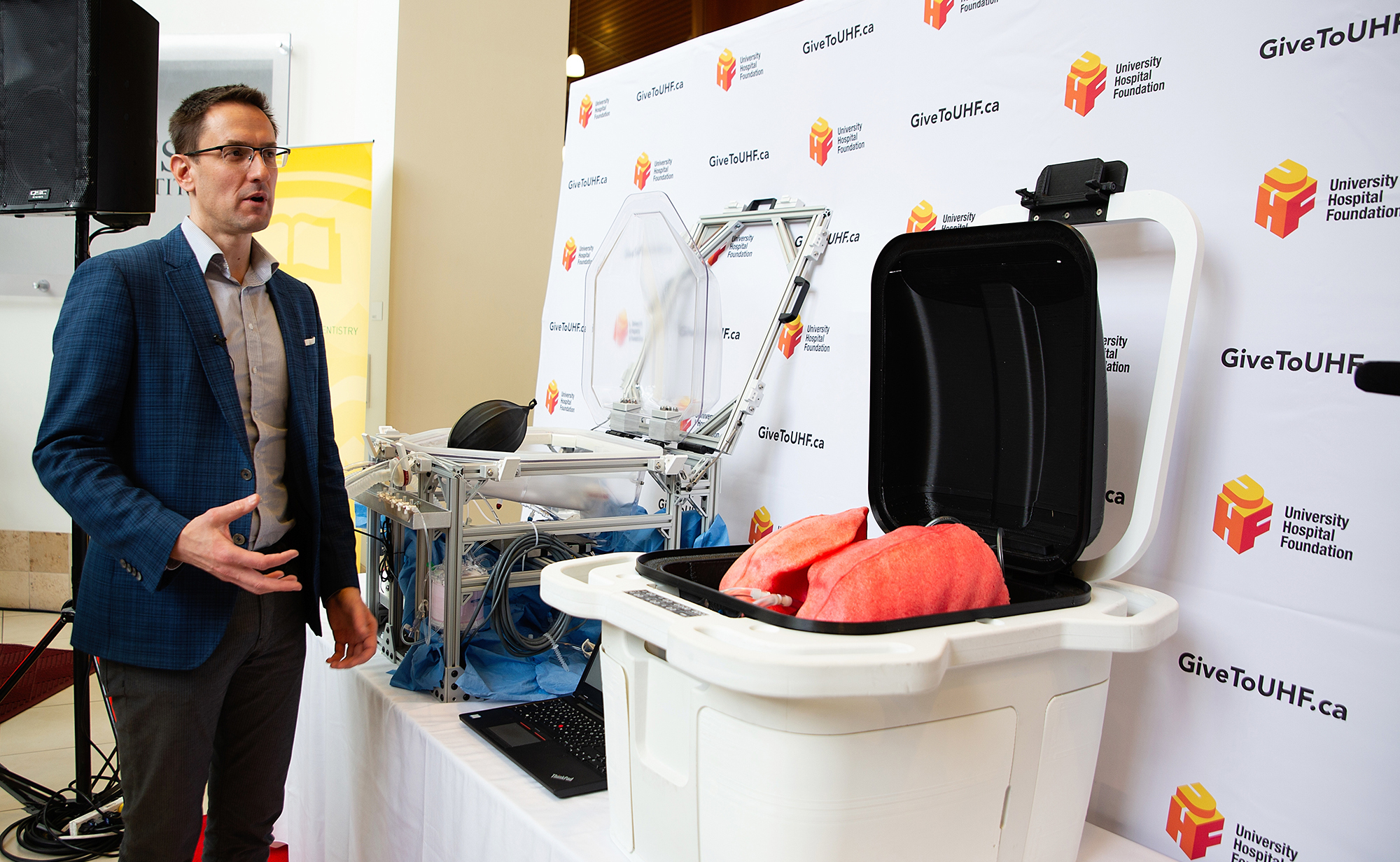
Surgeons Darren Freed and Jayan Nagendran. (Photo: Laughing Dog Photography)
The Ex-Vivo Organ Support System (EVOSS) confirmed its potential in November 2019, when a University of Alberta-led clinical trial at Alberta Health Services' Mazankowski Alberta Heart Institute resulted in 12 successful lung transplants. The project, partially funded by the University Hospital Foundation, provided patients with a life-saving opportunity using organs that would have otherwise not been viable.
EVOSS, invented and developed by University of Alberta medical researchers, is making strides in the mission to solve two of the biggest issues in organ transplantation-the number of healthy organs available and the limited window of time to get a donated organ to a patient.
U of A surgeons Darren Freed, '98 MD, and Jayan Nagendran, '01 MD/'09 PhD, developed the EVOSS, a platform that uses negative-pressure ventilation to replicate the way our chest cavity expands and contracts with each breath. By mimicking the natural process of breathing, it ventilates donated lungs in an ex-vivo ("out of the living") organ perfusion device, which constantly supplies the lungs with blood and oxygen and keeps them warm, similar to the conditions inside the body.
Freed, director of research for the Alberta Transplant Institute, says the negative pressure model has been shown to reduce injuries to the lungs and improve the ability to repair damage. It may also lead to an increase in the number and quality of organs available for transplant.
Currently, organs are stored on ice while being transported, which often results in organ damage. The only thing physicians can do to minimize the risk of damage is reduce the time between when the organ is harvested and when it is transplanted.
Lungs can be kept from six to eight hours on ice, but up to 48 hours on the EVOSS device. This additional time also allows for organs to be assessed and repaired, which increases the number of viable organs available.

Darren Freed with the Ex Vivo Organ Support System. (Photo: University Hospital Foundation)
Partnerships that change lives
The EVOSS project was possible thanks to a more than $1-million investment from the University Hospital Foundation and Alberta Transplant Innovation Fund (ATIF), a partnership between Alberta's Ministry of Economic Development, Trade & Tourism; Astellas Pharma Canada Inc.; and the University Hospital Foundation. The research was additionally supported through the Canadian Donation and Transplantation Research Program and the Alberta Transplant Institute, both led out of the U of A.
"By investing donations in innovative research and technology development, we are investing in the future of health care, and ultimately improving patient care, outcomes, and quality of life," said Christy Holtby, vice-president of Strategic Partnerships & Annual Giving with the University Hospital Foundation. "Supporters of the University Hospital Foundation are not just impacting care right here in Edmonton, but around the world… . We are proud to support visionaries like Dr. Freed and Dr. Nagendran in the groundbreaking work they are accomplishing."
The partnerships and the positive outcomes of the clinical trial will accelerate the transition of Freed and Nagendran's research discovery into commercially viable innovation, getting one step closer to making it available for patients everywhere.
A promising future, one organ at a time
According to Freed, the idea of continuous perfusion of organs for transplantation isn't a new one, but in the last 10 to 15 years there has been a push to improve organ preservation rates.
"The U of A has a very large transplant volume, and there is a very strong transplant science academic community here," said Freed. "The science of ex-vivo perfusion is still in its infancy in a lot of ways, so we need to continue to study and be diligent, which is why multidisciplinary research like we can do here is so critical to realizing the full potential of ex-vivo organ donation."
The research team is also working on inserting this technology into portable devices capable of transporting any type of donated organ.
"Not only is it an opportunity to improve the quality of donor organs around the world, but it's an Alberta-specific problem that we are addressing due to our unique geography," said Nagendran, director of research for the U of A's Division of Cardiac Surgery.
The University of Alberta Hospital has the largest geographic catchment area in the world for a single transplant centre, covering over six million square kilometres.
"We are frequently facing difficulties because an organ has been out of the body for a long time, in spite of trying to get it here as soon as possible," said Nagendran, who performed the first ex-vivo perfusion lung transplant in Alberta in 2013 and brought the first portable ex-vivo lung perfusion device to the U of A as part of a worldwide clinical trial. "It's one of the reasons why innovation is at the heart of what we do in Edmonton."
"I don't think that it's a stretch to say that the future of transplantation is ex-vivo organ perfusion," said Freed. "There will be a time in the near future when 90 per cent of all organs are transplanted having been perfused out of the body."